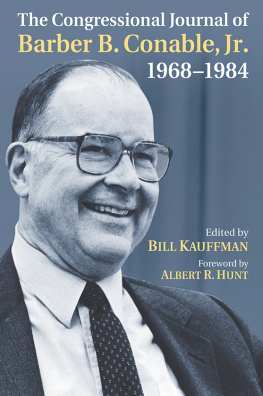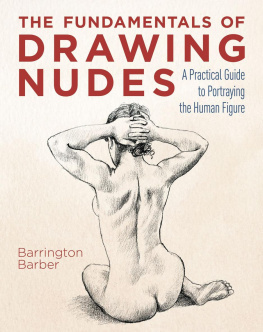Foreword
The best beat in Washington for a reporter is not the White House, radiating glamour and power. It is Congress, where in good times and bad the nexus of policy and politics is omnipresent and the extraordinary diversity of America is on display.
Those 535 men and women represent every region and economic, social, and political stratum of the country. Watching this political melting pot try to reach consensus on huge issueswar and peace, taxes, health careis to understand the value and the challenges of a representative democracy. It is often unruly, sometimes cowardly. Winston Churchill reminded us that democracy is the worst form of government except for all the others. Important legislation involves complex challenges and competing claims.
Above all, it is about people. I covered Congress for ten years and tried to stay in touch during subsequent decades. There were formidable figures in those times: Kennedy, Dole, Pelosi, Kemp, Moynihan, ONeill, Baker. None shaped my knowledge of legislative politics better than Barber B. Conable, a less recognized Republican lawmaker from upstate New York who served in the House from 1965 to 1985. His colleagues cited him as the most respected member of that body; he was a close associate of Gerald Ford and George H. W. Bush and had many Democratic admirers. For seventeen years he kept a journal, periodically musing about big events in an era that included Vietnam, Watergate, political realignment, and major changes in entitlements and taxes, where he played a key role. He had a gift for expression and astute insights. These writings were rendered in real time, not retrospectively, when we usually try to make ourselves look better. They illustrate Bismarcks admonition that there are two things one should not watch being made: sausage and legislation. What one author called the dance of legislation is not a ballet.
Taxes, Conables forte as the leading Republican on the powerful House Ways and Means Committee, seem arcane to many, but ultimately they boil down to who gets what and why. Conable reveled in the drama of getting there. He hated the familiar mantra, If you have to explain anything, youre in trouble. To his constituents, colleagues, and journalists, he was a great explainer.
Conable wrote about the machinations of major tax measures in 1975, 1977, and 1981; trade and pension bills; the National Commission on Social Security Reform (of which he was a member); and the overall climate of the body politic on Capitol Hill. He never shied away from his personal, often partisan, views but captured the crazy quilt of politics: the bill is dead on Monday, revived on Tuesday, taking lethal flak on Wednesday, recovering on Thursday, a deal on Friday. Compromises or concessions that seemed impossible last week are this weeks panacea.
The 19821983 Social Security Commission, led by Alan Greenspan, was a classic exercise. Conable thought a deal was critical for the solvency of the Social Security Trust Fund, but it seemed politically impossible, given the sensitivity of the issue and the differing priorities of the chief protagonists: President Ronald Reagan and House Speaker Thomas P. (Tip) ONeill agreed on little. In his journal, Conable pronounced the effort doomed on January 13, 1983. Two days later, he marveled at the political and personal dexterity and skill that produced a deal. Given the fiscal future America faces after the catastrophic COVID-19 pandemic, policy makers would do well to read this account.
Conable had an acute sense of the human dynamics of legislating, as well as an appreciation of his fellow politicians and the role the good ones played. He was particularly high on Republican representatives such as Minnesotas Bill Frenzel, Wisconsins Bill Steiger, Ohios Bill Gradison, and, earlier, John Byrnes of Wisconsin. He admired them not because they were fellow moderate-conservatives but because they were smart, serious legislators. Similarly, his disdain for a right-wing bomb thrower like Phil Crane of Illinois was based on the fact that Crane was a prancer, not a performera waste of time.
Conable overrated the achievements of the often-heralded Wilbur Mills, Ways and Means chairman during Conables first eight years on the committee (Mills enjoyed institutional powers that his successors did not have). And he chronicled the evolution of a successor chairman, Democrat Dan Rostenkowski of Illinois, from committee errand boy for Chicagos Mayor Daley to shrewd legislatora politician from head to toe.
Here I digress to tell a story that Barber would have loved: A House-Senate conference committee was hammering out the two chambers different versions of the historic 1986 tax reform bill, which cut rates, long sought by conservatives, and slashed loopholes, the dream of liberals. The conference leaders, Rostenkowski and Republican senator Bob Packwood of Oregon, agreed not to include anything that was not contained in one of the two versions of the bill. One day Packwood asked if he could slip in a very minor measure pertaining only to his home state. When the House chair thundered his objection, the senator backed down, explaining that it was just a favor for an old friend. Well, replied the wily Rosty, if that was the case, then it would be okay. The next day Rosty got Packwood to accept a much larger extraneous measure, no doubt for an old friend.
Conable had a knack for brilliantly sizing up his colleagues from the opposition. He showed a grudging affection for a political hack like Jimmy Burke of Massachusetts, who boasted that he voted for every appropriations bill and every tax cut and voted against every debt ceiling increase. When an incredulous Conable suggested that this was not entirely logical, Burke replied, Do you think this place is on the level? Conable did think so, and he admired those Democratic colleagues who thought so too: Californias Jim Corman, Floridas Sam Gibbons, and Illinois Abner Mikva, who possessed a sparkling ability, according to Conable. In contrast, Ohio Democrat Wayne Hays, a power in the House, repulsed him: His whole personality reeks of corruption. Sure enough, Hays was soon caught up in a scandal and forced out of office. Conable also understood the mediocrity of senior members such as Oregons Al Ullman, Millss successor as Ways and Means chairman, and ranking Republican Herman Schneebeli of Pennsylvania.













